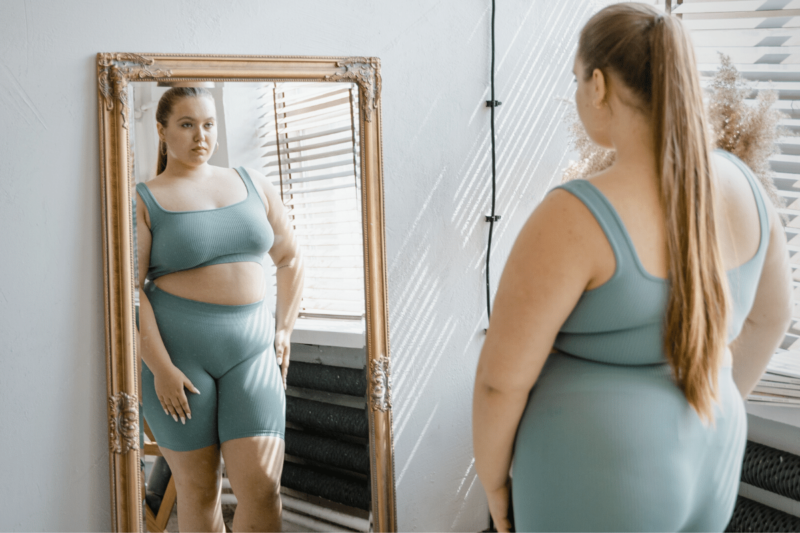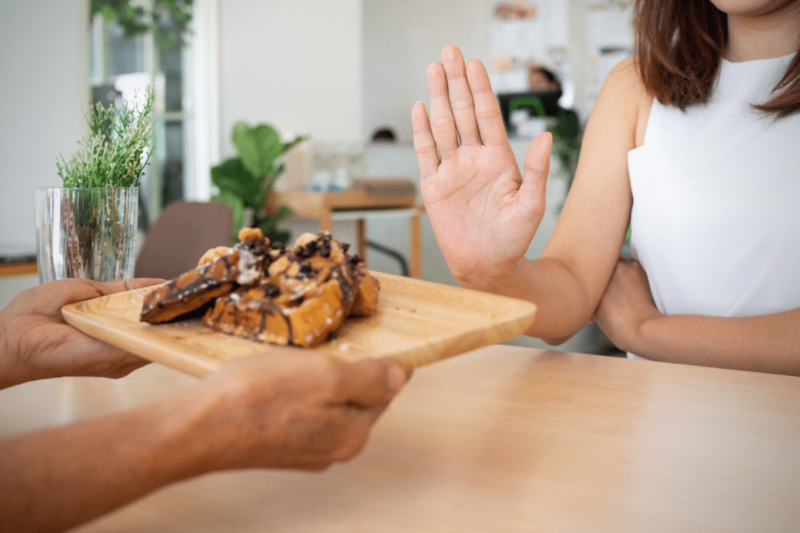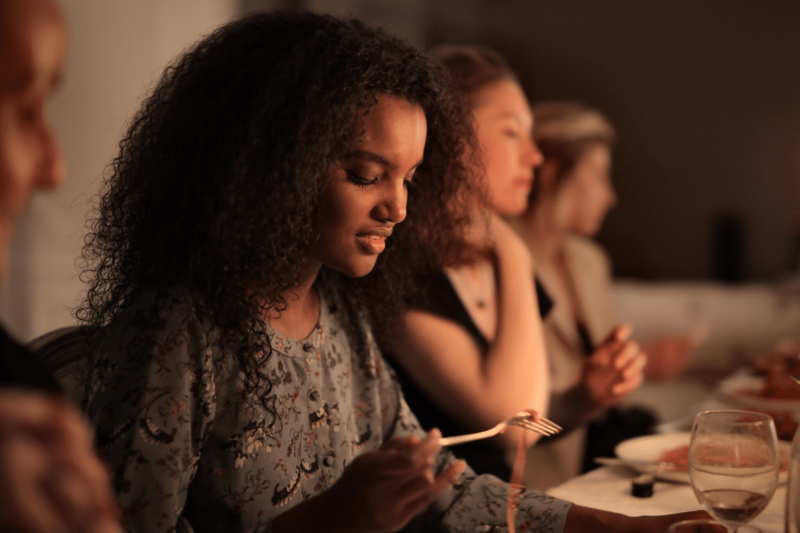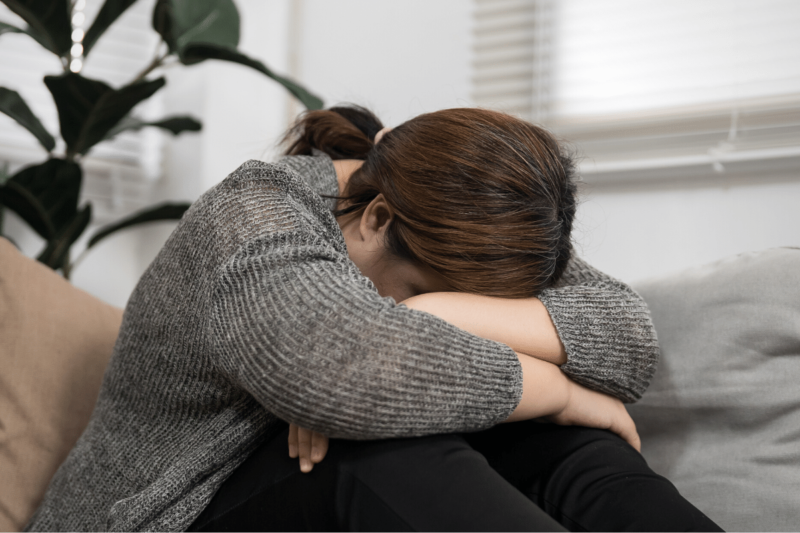
I see a lot disgrace — an excessive amount of disgrace — about our our bodies (their form, their dimension, their performance) and our meals (what we eat, after we eat, why we eat, how a lot we eat).
For those who’re experiencing meals and physique disgrace, I would like you to know two issues:
- One, you haven’t executed something that warrants disgrace.
- Two, in case you are battling physique picture, or your consuming habits are inflicting you misery, then you definately deserve assist, not disgrace.
Why your “meals guilt” is basically meals disgrace
Fast, you’ve simply eaten a cupcake…what ideas are operating by way of your head? “Wow, that was actually scrumptious!” or “Why did I eat that? I’m so dangerous!”
It’s true that some meals are extra nutritious than others. That’s an goal truth, with no ethical implications. It’s one factor to acknowledge guilt and really feel disgrace since you deliberately ran over somebody along with your automobile otherwise you cheated on a take a look at. It’s fairly one other to really feel disgrace since you ate a cookie. Karla McLaren, creator of “The Language of Feelings” says disgrace is the pure emotional consequence of guilt and wrongdoing. However consuming a cookie isn’t unsuitable, simply as consuming broccoli isn’t virtuous.
It’s a typical perception that shaming ourselves about our less-nutritious meals selection, not less than a little bit, will assist us keep on observe with our vitamin targets, however most of the time it paralyzes us. Analysis reveals that harsh self-criticism about meals or physique contributes to disordered consuming patterns and poor physique picture, whereas self-compassion has the other impact.
A latest New Zealand research discovered that individuals who affiliate chocolate cake with guilt as an alternative of celebration had been extra prone to have unhealthier consuming behaviors and fewer intention to eat wholesome sooner or later.
What occurs while you really feel disgrace about consuming one thing that you simply’ve determined isn’t wholesome? You may find yourself feeling that it’s not simply your meals selection that was dangerous — you may begin to really feel that you simply’re dangerous, too.

The vicious cycle of disgrace
For those who are typically inflexible along with your food plan, disgrace could make you extra restrictive along with your meals to compensate in your perceived lapse. For those who are likely to eat for emotional causes — as many individuals do — disgrace could make you are feeling even worse, main you to succeed in for extra meals in an try and self-soothe, resulting in extra disgrace.
It’s a cycle that feeds upon itself. Disgrace over a perceived meals transgression may also merely result in a “heck with all of it” perspective as a result of the injury has already been executed.
Nobody meals makes you wholesome or unhealthy. It’s about how the a number of meals decisions you make day-after-day add up. For those who commonly eat in a method that isn’t supporting your vitamin or well being targets, regardless of your greatest intentions, there’s probably a purpose.
Let’s say that you simply’re having a tough time stopping snacking within the night between dinner and bedtime — while you’re not even hungry. As an alternative of succumbing to disgrace, attempt being curious. Ask your self, “What’s actually occurring?”
Are you bored or drained? Are you burdened or offended? Are you unhappy or lonely? All of these emotions are reputable and worthy of consideration, however meals is at greatest a Band-Support for what’s actually consuming you.
It may be laborious to let go of meals disgrace. However it’s far worse to beat your self up after consuming a cookie than it’s to eat that cookie, savor each morsel, and assume, “Yum.” That sort of mindset could even assist you to be happy with one cookie reasonably than feeling such as you wish to devour a complete dozen.

From fats discuss to physique disgrace
Do you interact in fats discuss – self-disparaging remarks made to different folks about one’s weight or physique? For those who direct this discuss in the direction of your self, it’s a type of self-degradation. Maybe you criticize your physique weight, form, or stage of bodily health. (“I’m so fats” or “My thighs look large in these shorts” or “I’m so off form…I really feel like a giant blob.”)
Fats shaming is actually fats discuss directed at somebody’s physique. This may very well be your physique, or another person’s physique, and it may be both direct (criticizing your individual physique or the physique of the particular person you’re speaking to) or oblique (making feedback to your pals about somebody’s physique when your goal isn’t current or can’t hear you). Not surprisingly, this usually accompanies food plan discuss/meals shaming, akin to speaking about:
- Whether or not a meals is “good” or “dangerous”
- Whether or not you’re “good” or “dangerous” primarily based on what you ate or are about to eat
- Whether or not you “ought to” or “shouldn’t” eat a meals
- The food plan you’re on (or planning to go on)
Most of my associates are weight impartial dietitians, so I don’t should take care of a variety of food plan discuss when sharing a meal. (I do hear a little bit from sure members of the family.) However my shoppers are always filling me in on what they should take care of from girls of their ebook teams or artwork courses, associates of associates, different academics within the lunchroom. (I’ve had quite a lot of shoppers who’re academics, they usually inform me that academics are the worst about this type of discuss.)
Right here’s why it is a drawback…

Meals and physique shaming does actual hurt
Fats discuss and food plan discuss (aka physique and meals shaming) could appear to be benign (non-harmful) behaviors, particularly if the particular person is speaking about their very own physique and their meals decisions, however they don’t seem to be benign.
Whenever you criticize somebody’s meals decisions or physique – whether or not the item of that criticism is you, somebody you’re with, a mutual acquaintance who isn’t with you, or a complete stranger – these phrases have a unfavorable and dangerous impression.
Each engagement in and publicity to fats discuss contributes to physique dissatisfaction, heightens our notion of societal and cultural stress to be skinny, and might push us into being overly invested in our look (self-objectification). These elements all erode high quality of life, which is dangerous sufficient, however in addition they improve the chance of adopting disordered consuming behaviors – and even creating an consuming dysfunction.
Think about that you’re in a bigger physique (possibly you don’t should think about this). You’re sitting with a buddy in a smaller physique than yours, and he or she begins going off about how she’s “too fats.” How does this make you are feeling about your individual physique? Do you are feeling disgrace?
Equally, what should you overhear somebody making disparaging feedback concerning the physique of a girl passing by. Perhaps she’s your dimension, possibly she’s smaller, possibly she’s greater. Both method, this could elicit ideas and emotions of:
- “If her physique’s ‘dangerous’ than what does that imply about my physique?” or
- “I higher be sure that I don’t achieve weight if that’s what may be stated about me.”
That is weight stigma, which analysis reveals harms each bodily and psychological well being.
So while you interact in such a discuss, it’s inconceivable to know who you’re shaming and harming, or to what extent, however make no mistake – you’re inflicting hurt.
Associated posts
This publish comprises Amazon Affiliate hyperlinks. As an Amazon Affiliate I earn from qualifying purchases.
Carrie Dennett, MPH, RDN, is a Pacific Northwest-based registered dietitian nutritionist, freelance author, intuitive consuming counselor, creator, and speaker. Her superpowers embrace busting vitamin myths and empowering girls to really feel higher of their our bodies and make meals decisions that assist pleasure, vitamin and well being. This publish is for informational functions solely and doesn’t represent individualized vitamin or medical recommendation.
In search of 1-on-1 vitamin counseling? Carrie presents a 6-month Meals & Physique program (intuitive consuming, physique picture, mindfulness, self-compassion) and a 4-month IBS administration program (low-FODMAP food plan teaching with an emphasis on growing meals freedom). Go to the hyperlinks to be taught extra and ebook a free intro name to see if this system is an effective match, and if we’re a great match!


